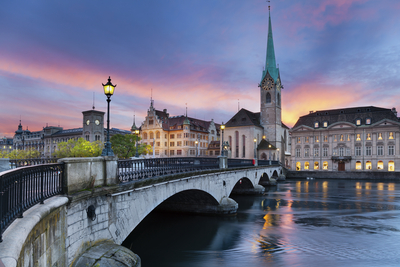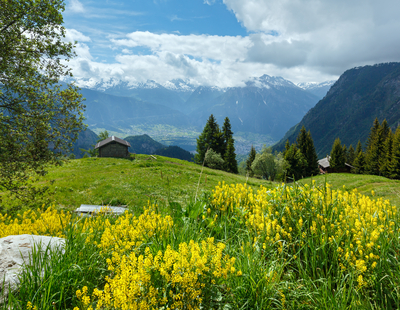The Swiss Culture
 Switzerland has for centuries been a neutral state, which means that it cannot take part in armed conflict unless it is attacked. Its forces can only be used for self-defense and internal security.
Switzerland has for centuries been a neutral state, which means that it cannot take part in armed conflict unless it is attacked. Its forces can only be used for self-defense and internal security.
The tradition of a citizen army, seen as an essential part of Swiss neutrality, runs deep. During the Cold War, the Swiss maintained one of Europe's largest land-based armies. The extremely costly militia system, under which every adult male was conscripted and remained in the reserves until middle age, has been slowly streamlined.
The Swiss believe that the militia policy of a rifle in every home deterred a Nazi invasion. A Nazi attack would have cost far more in German blood than did the easy conquests of the other European countries, whose governments had restricted firearm ownership before the war. Many hundreds of thousands, perhaps millions, of Swiss — and refugees who found sanctuary there — were saved because every Swiss had a rifle, and was prepared to resist.
To this day, every male, when he turns 20, is issued a full automatic military rifle and required to keep it at home. Universal service in the Militia Army is required. When a Swiss is no longer required to serve, he may keep his rifle (converted from automatic to semi-automatic) or his pistol (if he served as an officer).
Our Values
Let's investigate Switzerland's unique gun laws and culture.
While traveling around Switzerland on Sundays, everywhere one hears gunfire. This is the Swiss practicing their favorite sport, their national sport. They are doing their obligatory practicing for the regional, Cantonal or federal shooting festivals, as their ancestors did. Everywhere you go you meet city people and country people carrying rifles. These words were written by General Henri Guisan, commander in chief of the Swiss Militia Army, the year before World War II began.
Throughout the country, people are free to come and go for shooting competitions, and competitors are commonly seen with firearms on trains, buses, bicycles, and on foot.
In 1939, just before Hitler launched World War II, Switzerland hosted the International Shooting Championships. Swiss president Philipp Etter told the audience, which included representatives from Nazi Germany:
There is probably no other country which, like Switzerland, gives the soldier his weapon to keep in the home.... With this rifle, he is able every hour, if the country calls, to defend his hearth, his home, his family, his birthplace.... The Swiss does not part with his rifle.
Switzerland won the service-rifle team championship. The lesson was not lost on the Nazi observers.
Canton Oversight

For centuries, the Swiss cantons (states) had no restrictions on keeping and bearing arms, though every male was required to provide himself with arms for militia service. By the end of the 20th century, some cantons required licenses to carry pistols, imposed fees for the purchase of certain firearms (which could be gotten around by buying them in other cantons), and imposed other restrictions, but never interfering with the ever-present shooting matches.
In other cantons — usually those with the lowest crime rates
Federal Rule
— one did not need a police permit for carrying a pistol or for buying a semiautomatic, look alike Kalashnikov rifle. A permit was necessary only for a non-militia machine gun. Silencers or noise suppressors were unrestricted. As a matter of fact, he Swiss federal government sold to civilian collectors all manner of military surplus, including antiaircraft guns, cannon, and machine guns.
In 1996, the Swiss people voted to allow the federal government to legislate firearms, and to prohibit the cantons from regulating firearms. Some who favored more restrictions (as in other European countries) saw this as a way to pass gun-control laws at the federal level; those who objected to restrictions in some cantons saw it as a way to prevent cantonal regulations.
The result is a federal firearms law that imposes certain restrictions, but leaves virtually untouched the ability of citizens to possess Swiss military firearms, and to participate in competitions all over the country.
The Federal Weapons Law of 1998 regulates import, export, manufacture, trade, and certain types of possession of firearms. The right of buying, possessing, and carrying arms is guaranteed with certain restrictions. The right of buying, possessing, and carrying arms is guaranteed with certain restrictions.
Gun Control Future
The law forbids fully automatic arms and certain semiautomatics but Swiss military assault rifles are excluded from this prohibition. (The exclusion makes the prohibition nearly meaningless.) Further, collectors may obtain special permits for the "banned" arms, such as submachine guns and machine guns.
Swiss gun culture is rooted in patriotism. After completing compulsory military service, men are expected to keep their service weapons in case of an emergency mobilization.
Gun-rights advocates say that stricter laws are bound to fail. “It’s not a question of availability,” says Tobias Ruggli, an airline pilot who keeps his military rifle at home in Winterthur and has practiced target shooting since he was a teenager. “You’d always be able to obtain a weapon, even illegally,” he says.
Others contend tighter regulation could curb suicides and domestic violence. Switzerland’s gun suicide rate is the second-highest in Europe, close behind Finland’s. A 2011 study showed that 43 percent of homicides within Swiss households were committed with firearms, a far higher rate than in neighboring countries. Parliament is unlikely to approve anything tougher than the record-sharing legislation, because the Swiss tend to view mass killings as a “medical” issue rather than a legal one, says Martin Killias, a professor of criminal law and criminology at the University of Zurich. says. “There are analyses on the state of mind of the offender, what had gone wrong in their childhood, their marriage, all that."